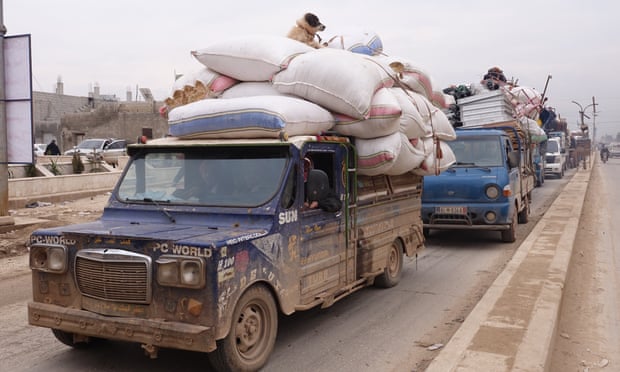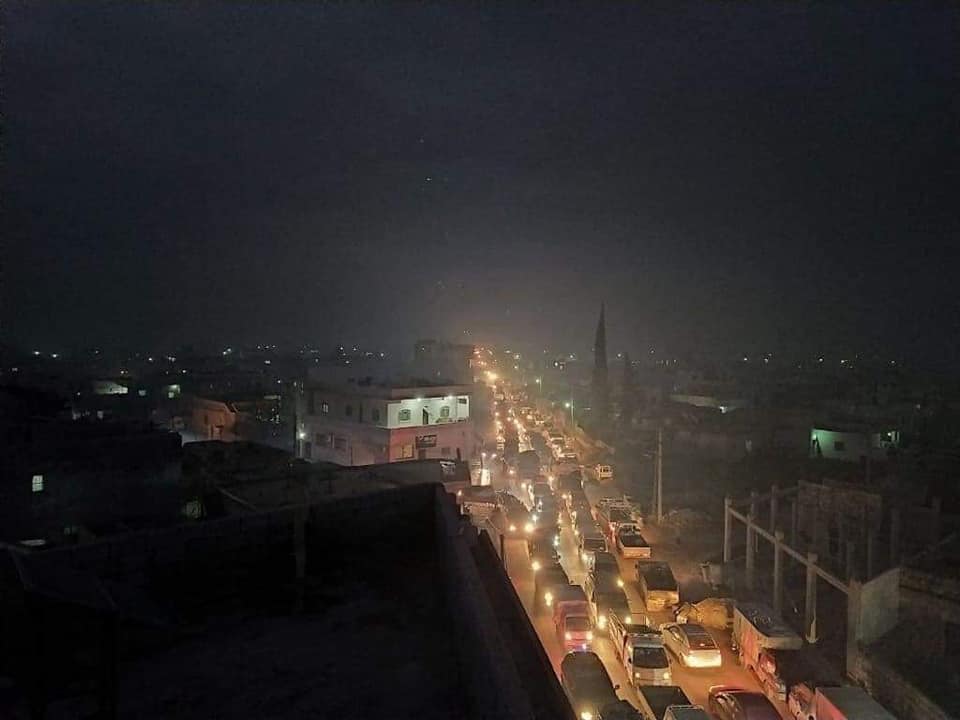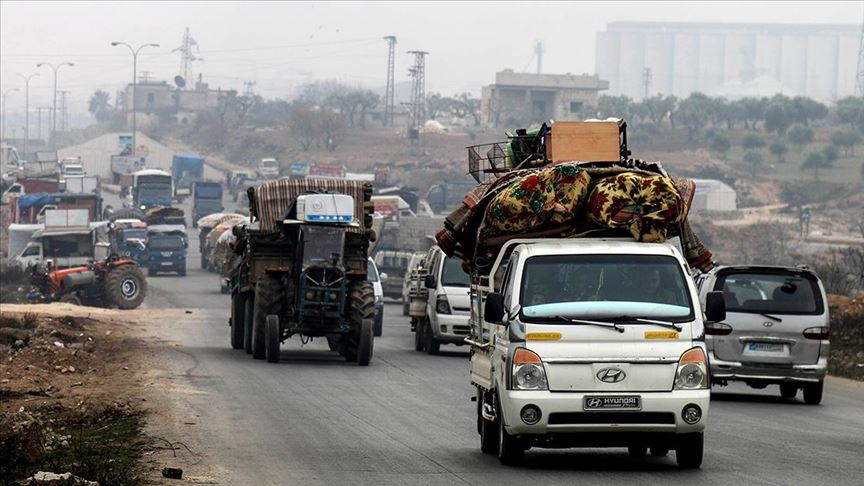تركيا تتدخل وترفع التوترات بعد أسابيع من القصف الجوي على أراضي المعارضة
05 / شباط / فبراير / 2020

*ترجمة: مع العدالة
نشرت صحيفة “الغارديان-The Guardian” البريطانية تقريراً اليوم 05/02/2020 حول موجة النزوح الأخيرة من الشمال الغربي السوري بسبب الهجوم الشرس للنظام السوري الذي يرافقه قصفٌ جوي من قبل الطائرات الروسية؛ وجاء في التقرير أن ما يزيد عن نصف مليون شخص نزحوا نحو الحدود التركية ومناطق خارج إدلب وقراها للنجاة بأرواحهم بعيداً عن القتال والقصف الجوي والبري في مناطقهم.

- تركيا بدورها تدخلت في القتال عبر إرسال مدرعات وجنود إلى مناطق في إدلب ما أثار التوترات بين دمشق وأنقرة وموسكو.
أسابيع من القصف الجوي المكثف من قبل قوات بشار الأسد وحلفائه الروس وهجوم بري كبير أدّى كل ذلك إلى إفراغ بلدات بأكملها في شمال غرب محافظة إدلب ودفع أعداد هائلة من المدنيين الفارين شمالا نحو الحدود التركية.
وفي يوم الاثنين، أسفر تبادل نادر لإطلاق النار بين القوات التركية المنتشرة حديثاً وقوات الأسد عن مقتل ثمانية عسكريين أتراك وما لا يقل عن 13 جندياً سورياً، وهو الاشتباك الأكثر أهمية بين الجانبين في الصراع المستمر منذ تسع سنوات.

يضيف التقرير أنه في يوم الأربعاء، قال الرئيس التركي رجب طيب أردوغان “إذا لم تنسحب القوات الحكومية السورية إلى خط وقف إطلاق النار في وقت سابق بحلول نهاية الشهر، فإن تركيا ستتخذ المزيد من الإجراءات العسكرية.”
وقال أردوغان إنه أكد مجدداً نفس النقطة للرئيس الروسى فلاديمير بوتين الداعم الرئيسي للأسد خلال مكالمة هاتفية فى وقت متأخر من الليل يوم الثلاثاء .
كما قال أردوغان لسياسيين من حزبه الحاكم “هذا عهد جديد في سوريا. لا شيء يمكن أن يبقى على حاله عندما تراق دماء الجندي التركي”.
ويسعى الرئيس التركي إلى دعم اتفاق خفض التصعيد في إدلب الذي توسطت فيه موسكو وأنقرة في عام 2018، والذي يدعم بعض الجماعات المعارضة في المنطقة. وقد تم خرق وقف إطلاق النار بشكل روتيني من قبل كلا الجانبين، لكن هجمات النظام تصاعدت منذ أن سيطرت “هيئة تحرير الشام”، التابعة سابقاً لتنظيم القاعدة في سوريا، على المنطقة في العام الماضي. وبدأ هجوم جوي وبري واسع النطاق في كانون الأول/ديسمبر.

“صورة لحافلات تقل مدنيين يفرون من مناطقهم في الشمال السوري بسبب قصف النظام والطيران الروسي”
وقد وضعت أعمال العنف سكان إدلب البالغ عددهم 3 ملايين نسمة في خطر ما تقول وكالات الإغاثة إنه قد يكون أسوأ أزمة إنسانية في سوريا حتى الآن. وتركيا، التي تؤوي بالفعل حوالي 4 ملايين لاجئ، غير راغبة في فتح حدودها أمام المزيد.
وقال “ديفيد سوانسون”، المتحدث باسم مكتب تنسيق الشؤون الإنسانية التابع للأمم المتحدة: “منذ 1 كانون الأول/ديسمبر، نزح حوالي 520,000 شخص من منازلهم، غالبيتهم العظمى – 80% منهم من النساء والأطفال.
وعن حالات التهجير والنزوح بسبب الحرب التي شنها النظام السوري وحلفاؤه على السوريين جاء في التقرير أن هذه الهجرة الجماعية التي تزامنت مع فصل الشتاء القاسي، تعد واحدة من أكبر حالات النزوح والتهجير القسري منذ بداية النزاع في عام 2011، حيث تم تشريد أكثر من نصف سكان سوريا قبل الحرب البالغ عددهم 20 مليون شخص من ديارهم.
وقال محمد بهجت، 34 عاماً، إنه وعائلته نجوا من القصف للمرة الثالثة خلال أيام. وقال لوكالة “فرانس برس”، وهو يجلس أمام شاحنة صغيرة بجوار زوجته وثلاثة أولاد صغار: “لقد هربنا في منتصف الليل وليس لدينا أي فكرة إلى أين نذهب”. “أنت لا تعرف أبداً متى يسقط صاروخ أو قذيفة”.

“صورة تظهر شاحنات وجرارات زراعية تنقل النازحين مع أثاث منازلهم من إدلب وقراها نحو الحدود التركية”
ووصف الأمين العام للأمم المتحدة “أنطونيو غوتيريس” التصعيد بأنه “مقلق للغاية” ودعا إلى وقف الأعمال العدائية.
استولت قوات النظام السوري على عشرات القرى وبعض البلدات، بما في ذلك معقل المعارضة السابق في معرة النعمان، وتواصل تقدمها، مما دفع السكان النازحين إلى الاقتراب أكثر من الحدود التركية.
كما استولى (الجنود السوريون) وجماعات الميليشيات المتحالفة معهم على الكثير من الأرض في جنوب المنطقة هناك، وأيضاً يهاجمون من محافظة حلب إلى الشرق، وأخذوا أكثر من 20 بلدة وقرية من المعارضة والجهاديين خلال الـ 24 ساعة الماضية، وفقاً للمرصد السوري لحقوق الإنسان، ووكالة (سانا) التابعة للنظام.
أما في بلدة “حزانو”، شاهد مراسل وكالة “فرانس برس” عشرات الشاحنات الصغيرة مكدسة بالممتلكات، وتسير على طول الطريق الرئيسي. ولقد تلاصقت الشاحنات ببعضها وهي تحمل الرجال والنساء والأطفال إلى جانب البطانيات والسجاد وأحواض الغسيل والأثاث.
وفقاً للمرصد السوري لحقوق الإنسان أنه قد قتل ما يقرب من 300 مدني منذ منتصف ديسمبر في قصف على مناطق إدلب. وقال خبراء الأمم المتحدة يوم الثلاثاء إن الهجمات الأخيرة على إدلب يمكن أن تشكل انتهاكات للقانون الدولي.
كما استشهدت لجنة التحقيق الدولية المستقلة التابعة للأمم المتحدة بشأن الجمهورية العربية السورية بتقارير “الهجمات على البنية التحتية المدنية، بما في ذلك المدارس والأسواق والمرافق الطبية” خلال الأسبوعين الأخيرين.
وقالت في بيان إن “الاستهداف المتعمد والمنهجي للمستشفيات يتبع نمطاً وثقته بالفعل اللجنة وقد يرقى إلى جرائم حرب.”

 Eng
Eng